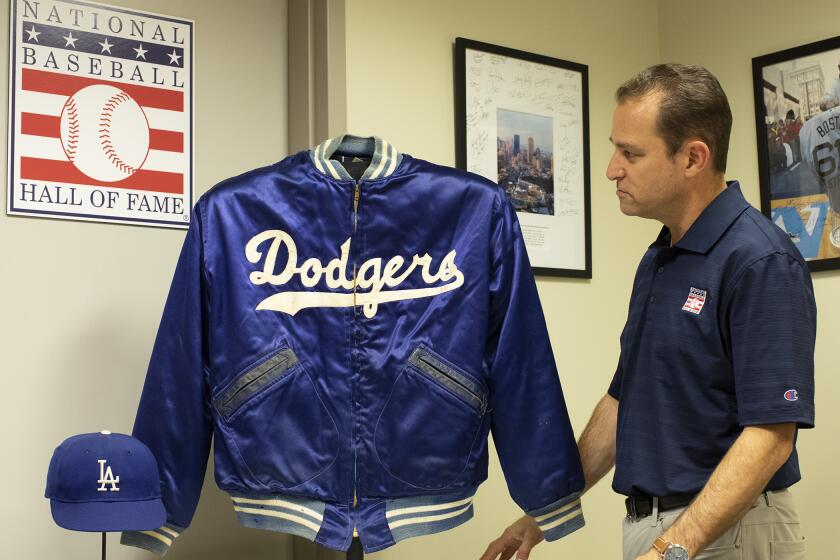Inside the Ballpark, a Blessing
- Share via
DURHAM, N.C. — We settle into seats near the bull, which looms over the left-field wall and puffs smoke each time the Bulls hit a home run.
I wonder if we will be a target, sitting here on the Fourth of July. Ten thousand people in one place--easy pickings. Not the Mall in Washington, D.C., but easier to breach.
No, we’re too small for a terrorist’s attention. Bigger targets abound. But if the next shoe does fall here, we will deal with it.
I am scribbling lineups into my scorecard when we stand and join a men’s chorus in the National Anthem. They’re a great choice--not some fading rocker grabbing headlines, but a church chorus accustomed to helping other people sing.
On the field, ballplayers stand at attention before an enormous 50-star American flag hanging over right field, a flag much larger than the tattered 15-star banner that waved over Baltimore after shelling by British troops in 1814.
Next to each player stands his Little League “escort,” also at attention, cap over heart. In the stands people sing. Nobody is fidgeting this year. Memories of 9/11 are fresh.
Tonight’s pitching is weak. The base paths are busy. So is Section 213, where vendors, restless kids and hungry grown-ups form a constant parade.
Freedom is chaotic, offensive to the orderly. Freedom might begin in the brave signing of noble documents, but it plays out in what Thomas Jefferson called “human events.”
For the seventh-inning stretch, we don’t proceed immediately to “Take Me Out to the Ballgame.” First we join in “God Bless America.” Composed in 1918 by a 30-year-old Jewish immigrant as a show tune, “God Bless America” was revived in 1938, as world war loomed, and introduced by Kate Smith on her radio broadcast. Irving Berlin dedicated his hit’s royalties to the Boy Scouts and Girl Scouts of America.
Freedom is that cantor’s son escaping pogroms in Jew-hating Russia, looking beyond his Jew-hating Roman Catholic in-laws, composing show tunes like “White Christmas” and “Easter Parade” and patriotic songs without any formal musical credentials.
For a time after Sept. 11, as an angry and perplexed nation rediscovered “God Bless America,” some feared it would become an anthem of vengeance. We were under assault by “holy warriors.” Would we wage “holy war” in return, resorting to those religious hatreds that so scarred our former homelands?
The answer, tonight, is no. Many an eye is filmy with tears as we invoke God’s blessing on our “home sweet home.” No rage, no holy war, just gratitude. I hear no shouts against enemies.
On the field I see teammates from Mexico and Texas, enemies in the 1840s; and teammates from Louisiana and Ohio, enemies in the 1860s.
Gratitude and rage are always in tension, as are blessing and curse, peace and war, neighborliness and scapegoating. The balance can shift. If further terrorist attacks come, as zealots turn a nation’s freedoms into weapons, Irving Berlin’s “song of peace” could quickly become an anthem of war.
That could happen, not because we are a bad people, but because fear always threatens freedom.
Freedom, you see, isn’t just throwing off an oppressor’s chains. Freedom is restraining oneself in respect for others. Freedom is allowing wars to end. Freedom is resisting the chains we place on our own spirits by hatred, revenge and religious triumphalism.
Freedom is the hard work of stopping terrorists, but also the “soft” work of building a just society hand in hand with people whose faith may disagree with ours.
Freedom is a minor league baseball game ending peacefully on a soft summer night, ballpark lights going out, and Ray Charles singing “America the Beautiful” as fireworks erupt beyond the smoke-breathing bull. His rendition starts with the second verse and concludes with the first. For in America, a blind man of color can say thanks any way he wants.
*
Tom Ehrich is a writer and computer consultant. An Episcopal priest, he lives in Durham, N.C.
More to Read
Go beyond the scoreboard
Get the latest on L.A.'s teams in the daily Sports Report newsletter.
You may occasionally receive promotional content from the Los Angeles Times.










